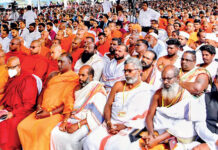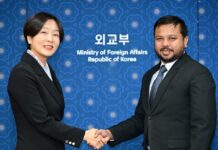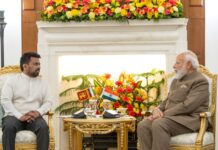As part of re-visiting and inquiring into the one-hundred-year history of Humanities and Social Sciences Education in Ceylon/ Sri Lanka and as a satellite conference of the Jaffna University International Research Conference 2022 (JUICE 2022), the Faculty of Arts at the University of Jaffna hosts the Maanudam Research Conference 2022under the theme “One Hundred Years of Humanities and Social Sciences Education – Trajectories, Continuities and Discontinuities” on 29th and 30th of July at the University of Jaffna.
The relevant press release delivered by the organizing committee of the conference is as follows.
The centenary anniversary (1921 – 2021) of the founding of tertiary education in the Humanities and Social Sciences in Sri Lanka falls at a time when the country is reeling under a pandemic and the crises it has caused in various domains including education. As part of re-visiting and inquiring into this one-hundred-year history, marked by both radical openings and vexing challenges, and as a way of approaching and understanding the present moment in the Humanities and Social Sciences in the light of this history, the Faculty of Arts at the University of Jaffna hosts the Maanudam Research Conference 2022 as a satellite conference of the Jaffna University International Research Conference 2022 (JUICE 2022) under the theme “One Hundred Years of Humanities and Social Sciences Education – Trajectories, Continuities and Discontinuities” on 29th and 30th of July 2022 at the University of Jaffna.
The inauguration ceremony of the research conference will be held on the 29th of July (Friday) at 3.30 p.m. at the Kailasapathy Auditorium, University of Jaffna. The welcome speech will be given by Dr. T. Sanathanan, Convener, ‘Maanudam’ 2022 and, Addresses of Prof. K. Suthakar, Dean, Faculty of Arts and Prof. S.Srisatkunarajah, Vice-Chancellor, University of Jaffna will be followed. Dr. M.Thiruvarangan will give the address of the Chief Editor.
The keynote addresses will be given by Dr. K. Indrapala, the First Dean of the Faculty of Arts and the Former Professor, University of Jaffna on ‘The Humanities in the University of Jaffna: The First Decade (1974 1984)’ and Prof. Sujit Sivasundaram (University of Cambridge, UK) on ‘Humans and Environments in Lanka’. The vote of thanks will be delivered by Ms. Abiramy Rajkumar, Secretary of the Research Conference.
The Plenary Session, Special Sessions and Technical Sessions will be held on the next day (30th of July). The scholars, researchers, teachers, students, artists, activists and the larger public will present their study papers on the following sub-themes.
•The scope, content and nature of education and research in the Humanities and Social Sciences in pre and post- 1921 Ceylon.
•The trajectories these disciplines have taken and the continuities, discontinuities and shifts that have marked their lives within Sri Lanka’s universities.
•Philosophies, frameworks and paradigms that have informed and shaped teaching, learning and research in the Humanities and Social Sciences in Ceylon/Sri Lanka.
•Social, political, economic and cultural factors that impinged on the trajectories the Humanities and Social Sciences have taken in Ceylon/Sri Lanka.
•The role of the Humanities and Social Sciences in imagining, inspiring and bringing about democratization, community development, social justice, gender justice and cultural coexistence in Ceylon/Sri Lanka.
•The interventions made by the University of Jaffna and its community to support and strengthen local, regional and national struggles for diversity and pluralism, land, free education, de-militarization, memorialization, human rights, justice, equality, self-determination and coexistence.
•The cooptation of the Humanities and Social Sciences into hegemonic, chauvinistic, and neoliberal projects that have caused and furthered inequalities of ethnicity, religion, culture, region, class, caste, gender and sexuality in Ceylon/Sri Lanka.
•Centers and peripheries and dominant and resistant currents within the Humanities and Social Sciences in Ceylon/Sri Lanka.
•The crisis caused by the pandemic in Humanities and Social Sciences education and the resilience shown by these disciplines and the teaching, learning and research communities associated with them.
•The place and role of the Humanities and Social Sciences in today’s Sri Lanka and the world at large, and the directions these disciplines ought to take in the future.



